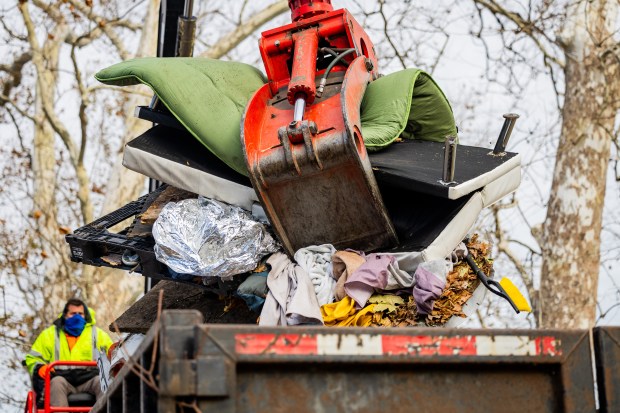As the early morning sun rose over the bare trees of Humboldt Park on Friday, Chaz Sago sorted through his patched-up orange tent, trying to pack up as many belongings as he could before the city trucks arrived.
Sago has lived in the Humboldt Park neighborhood for seven years, where he used to work as a carpenter. He became homeless about two years ago after a house fire destroyed “pretty much everything,” and has since primarily been living out of a tent in the park, he said.
He was offered an apartment by the city “five or six months ago” and put his name on a list to be placed, he said. Yet as of Friday morning, as the encampment was officially cleared and shut down, he was still waiting to get his keys.
“I’ll just gather what I can and count the rest as a loss,” Sago said. “If they would have gave me more notice, I could have been more prepared. … I’m not sure what I’ll do, but stay positive. Things have a way of working out for me.”
Just an hour later, city workers spray-painted an “X” on Sago’s tent. Steps away, a giant metal claw attachment crushed another tent before throwing it into the back of a garbage truck.
Dozens of city workers arrived with trucks and heavy machinery to clear a major homeless encampment in Humboldt Park amid frigid weather. About two weeks prior, Ald. Jessie Fuentes, 26th had announced the city’s plans to permanently shut down the site and begin to enforce an ordinance banning overnight camping and structures in the park.
Everyone living in the encampment was offered an apartment or a shelter bed, according to Fuentes. Sixty-three households were matched to housing during an “accelerated moving event” in September, though as of Thursday, only about two-thirds had been able to move into their new homes, according to the Department of Family and Support Services.
Those still at the encampment Friday morning — including individuals already matched to apartments but still waiting for them to be available — would all be offered a shelter bed in a newly opened non-congregate Rogers Park facility, Fuentes told the Tribune.
“We do not have the infrastructure to ensure the safety of our unhoused residents, to protect them from cold snaps in the middle of the night, to protect them from propane tanks exploding at night,” Fuentes said. “We want to make sure that folks are sheltered and housed, that they’re getting the support that they need. … We have a moral obligation to keep them safe.”
Yet some encampment residents told the Tribune on Friday that they had declined the apartments or shelter beds offered, and did not know where to go during the below-freezing weather.
Porfirio Elliott, who is waiting to be connected to housing, said that he didn’t want to temporarily move into a shelter with his partner Melissa due to a negative experience she had in a previous facility, as well as his fears of gang violence in a new neighborhood.
“Why are you putting everybody out right before Christmas?” Elliott said. “How come they can’t do it in the spring or in the summer? It’s their park, they do whatever they want with it. It’s just, my tent, the park workers came and destroyed my tent.”
Elliott, who has lived in Humboldt Park for six months, said he visited a friend for a few days over Thanksgiving and returned to find that his tent had been flattened by a bulldozer. His clothes had also been destroyed, he added.
Elliott and his partner have been “sleeping in staircases” for the past few nights, he said. A friend has offered to give them a new tent, Elliott said, which they plan to set up somewhere on the North Side as they wait for an apartment — “I’m going anywhere if they give me housing,” he added.
Many of the tents trashed by the city Friday were bright orange ice fishing tents distributed by the Orange Tent Project to keep homeless residents safer during cold weather. Kathy Lawten, an Orange Tent Project board member, stood in Humboldt Park on Friday watching a process that she described as “really sort of mean.”
“They were successful in placing people who had been living here a long time, so that’s the good part. The bad part is this,” she said, gesturing behind her toward where a few scattered residents were still packing as city workers and police advanced. “Most of these people don’t know where they’re going.”
As he sat outside his tent early Friday, Javier Hernandez, who moved to Chicago from Puerto Rico 16 years ago, said that although he had accepted the offer of a shelter bed, he had no idea where the shelter would be.
“We are here years and years and years, and you have to wait,” Hernandez said. “But I have to wait until what? To freeze and maybe die?”
During the summer months, the city cleared two other major homeless encampments through similar early-morning sweeps, aiming to fence off the sites and relocate residents to shelters. Advocates for the homeless, however, have criticized such strategies as insufficient and potentially traumatic for encampment residents, emphasizing that the only solution for homelessness is more permanent housing.
Particularly for those who do not want to go to shelters, these consecutive encampment clearings are “just pushing people from one area to the next,” said Ali Simmons, a spokesman for the Chicago Coalition to End Homelessness.
When news of the Humboldt Park encampment closure broke, it generated significant backlash from advocates and service providers who work with Chicago’s homeless community.
On Wednesday, advocates held a news conference at the encampment urging the city to reconsider its plans. At the end of last month, 20 outreach workers and leaders from seven service agencies signed a letter to Fuentes and the city’s chief homelessness officer Sendy Soto criticizing the planned closure and describing its potential enforcement as “criminalization.”
When asked about the plans to enforce a sleeping ban in Humboldt Park, Fuentes said Friday, “We are working really hard to make sure that we’re not criminalizing homelessness.”

According to a flow chart distributed to reporters Friday, people found in tents in Humboldt Park going forward will first be offered resources and connected to DFSS outreach workers. If they still refuse to disassemble their tent, Park District officials and Chicago police will remove the tent after a 24-hour warning period.
Throughout Friday morning, more than a dozen outreach workers and volunteers helped encampment residents pack up their belongings while the garbage trucks moved in.
Pastor Marcelo Pozo, who runs a homeless ministry through the New Life Covenant Church and works with the Humboldt Park encampment, spent the morning visiting the tents of those who remained. Standing on the frost-covered grass, he said he hoped everyone could get some type of housing.
“I don’t think it’s good for anybody to be living on the streets when it gets this cold, people can die,” he said. “I actually lost a friend who lives in an encampment by Lake Shore Drive on Tuesday. … I think it’s a good thing to help these people out of this.”




